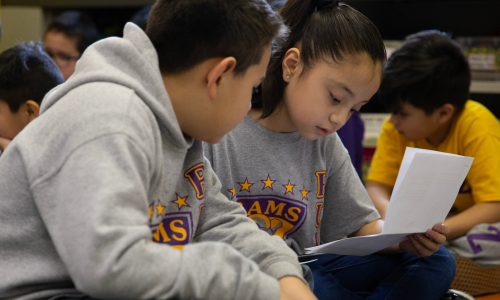
At NWEA, our mission is Partnering to help all kids learn®. We strive to truly live this mission across the organization, including on the research team. In practice, this means we want to do research that will have an impact, and we focus on conducting rigorous research that is timely, actionable, and directly relevant to the needs of schools who use our assessments.
The best way to make sure our research is practically relevant is by working directly with districts. We believe that doing good research means integrating multiple perspectives, especially from those closest to the most pressing issues and needs (that’s you!). We call these collaborations our research partnerships.
About research partnerships
Research partnerships are a cornerstone of our research team’s work. In these partnerships, we work closely with schools and districts on all aspects of a research project, from developing a research agenda that tackles questions that really matter to a school, to actively collaborating on the development of research outputs, to codeveloping dissemination plans that make sure findings are shared with all educators and community members who need them.
Partnership research is also important because it allows us to broaden our scope and ask new and important questions we wouldn’t otherwise be able to answer. NWEA researchers use the Growth Research Database, or GRD, a longitudinal repository of MAP® Growth™ test scores, to conduct research that shines a light on how students grow over time. But when it comes to the GRD, the well is deep (we collect anonymous MAP Growth data from millions of students going back decades) but it’s not very wide: we know only how students performed on MAP Growth, and some very basic demographic information.
The best way to make sure our research is practically relevant for MAP districts is by working directly with them.
Test scores alone cannot capture other critically important aspects of students’ experiences in schools. For instance, we know a student’s achievement and growth are impacted by factors like how positive a school’s climate is, the quality of the supports and services they receive, and how instructional time is used. Working in partnership with schools makes it possible to incorporate additional information about students to ask more nuanced questions and produce more actionable answers to those questions. These partnerships give us more than a few data points on a page; they paint a more complete picture.
Our commitment to educators
In the past, launching new research partnerships has often happened in rather happenstance ways. Maybe someone on the research team joined a call with a school administrator who had a question about their MAP Growth data. During that call, they spent some time chatting and realized they had a shared interest in a specific topic. The researcher suggested a collaboration and, voilà! A new partnership was born.
Moving forward, we want to be more intentional in how we seek out and establish new partnerships so that this opportunity is open to all who might be interested and who might benefit. To do this, we’ve launched a new research partnerships website. On it, you can learn about some of our ongoing and previous partnerships and our general approach to partnership work.
This new site also features prospective partnership ideas on topics that are of interest to us and that we think might be of interest to MAP schools as well. Think of this section as a really nerdy personal ad where we describe a research idea we have and the data and partner we’re looking for to help us ask—and answer—our question.
Right now, we’re interested in four broad research areas that we think are timely, actionable, and directly relevant to the needs of MAP districts and their students:
- Supporting subject/grade acceleration in schools
- Examining the effects of four-day school weeks
- Understanding the impacts of school discipline on student growth
- Establishing and validating algebra readiness cut scores
Reach out!
Want to learn more about our research areas? You can find more information about them on our site.
If any of our research areas resonate with you, let us know. Our site includes a form that will put you in touch with our team so we can discuss your interest further. (Just scroll to the bottom of the page.) Completing this form in no way obligates you to partner with us; instead, it provides an opportunity for us to explore if there is a partnership fit for a particular project. Also note that there is never any cost to districts working with us on these projects. We want this to be entirely of benefit to you and the broader education community.
At the end of the day, we simply want to do research that matters: research that is practical and relevant to what schools are dealing with in the moment. Through research partnerships—and, more importantly, by working with you—we believe we are better positioned to meet that aim.







